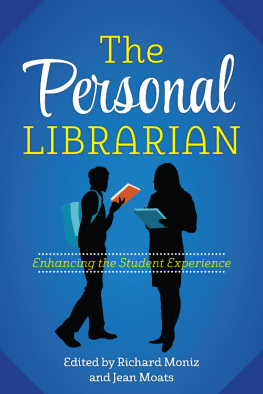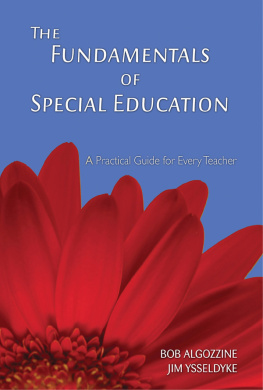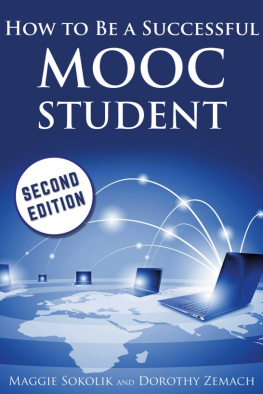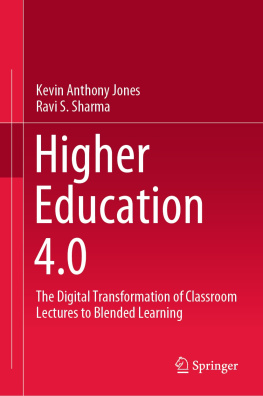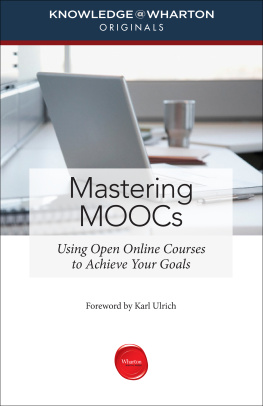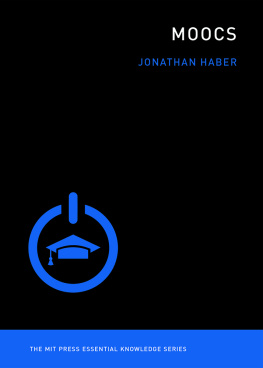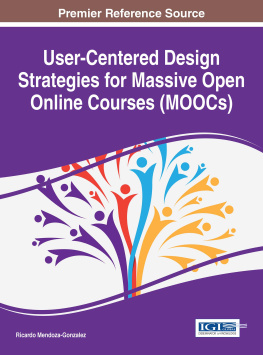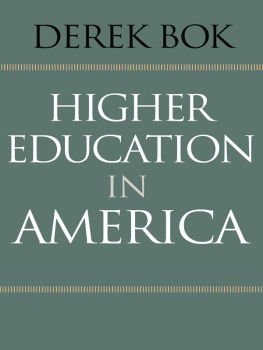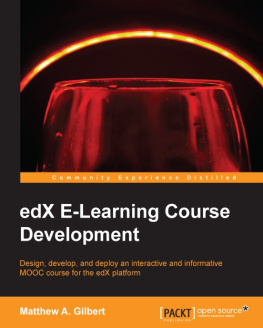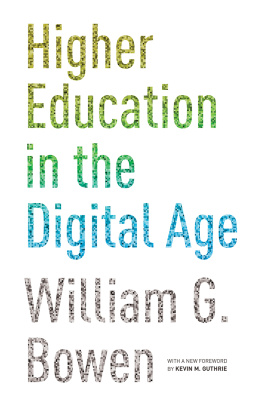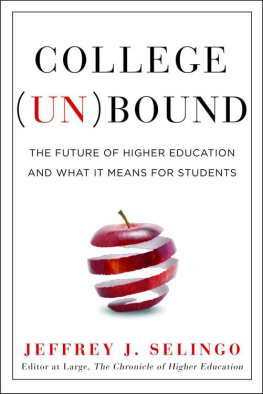MOOC S NOW
Everything You Need to Know to Design, Set Up, and Run a Massive Open Online Course
Susan W. Alman and Jennifer Jumba, Editors

Copyright 2017 Susan W. Alman and Jennifer Jumba
All rights reserved. No part of this publication may be reproduced, stored in a retrieval system, or transmitted, in any form or by any means, electronic, mechanical, photocopying, recording, or otherwise, except for the inclusion of brief quotations in a review, without prior permission in writing from the publisher.
Library of Congress Cataloging-in-Publication Data
Names: Alman, Susan Webreck, author. | Jumba, Jennifer, author.
Title: MOOCs now : everything you need to know to design, set up, and run a massive open online course / Susan Alman and Jennifer Jumba, Editors.
Description: Santa Barbara, California : Libraries Unlimited, [2017]
Identifiers: LCCN 2016048746 (print) | LCCN 2016059541 (ebook) | ISBN 9781440844577 (hard copy : alk. paper) | ISBN 9781440844584 (ebook)
Subjects: LCSH: MOOCs (Web-based instruction) | Distance education. | Educational technology.
Classification: LCC LB1044.87 .A46 2017 (print) | LCC LB1044.87 (ebook) | DDC 371.33/44678dc23
LC record available at https://lccn.loc.gov/2016048746
ISBN: 978-1-4408-4457-7
EISBN: 978-1-4408-4458-4
21 20 19 18 17 1 2 3 4 5
This book is also available as an eBook.
Libraries Unlimited
An Imprint of ABC-CLIO, LLC
ABC-CLIO, LLC
130 Cremona Drive, P.O. Box 1911
Santa Barbara, California 93116-1911
www.abc-clio.com
This book is printed on acid-free paper 
Manufactured in the United States of America
Contents
Miguel Figueroa
Curtis L. Kendrick and Irene Gashurov
Sarah Evelyn
Dorothy Pawlowski
Susan W. Alman, Jennifer Jumba, and Tina Jagerson
Susan W. Alman, Jennifer Jumba, and Tina Jagerson
Susan W. Alman, Jennifer Jumba, and Tina Jagerson
Susan W. Alman, Jennifer Jumba, and Tina Jagerson
Susan W. Alman, Jennifer Jumba, and Tina Jagerson
Sara Gillespie Swanson
Carolyn Dineen, Gwen Harris, and Wendy Newman
Foreword
When I speak with people from the library, education, technology, or nonprofit professions there is almost always a familiarity with MOOCs, even among those who have never participated in a course themselves. And then, when I speak with friends who work in business, finance, advertising, sales, or some other role, the majority of them arent immediately familiar with MOOCsor even the acronym unpacked to massive open online courses or brand-name providers like Coursera, edX, or Khan Academy. For as popular as MOOCs have become and as much potential as they have to revolutionize education, for now, it seems, they belong to those sectors that are most concerned with education, lifelong learning, discovery, and openness.
I guess this makes senseand perhaps makes clearer why MOOCs have a place in the future of library services. MOOCs mirror many of our own professional valuesaccess, education and lifelong learning, intellectual freedom, and even the public goodand advance the value we provide to society: discovery and curiosity, informed democracy, collaboration, and community development.
As MOOCs grow in popularity and as they play more important roles in education and learning, I am especially happy to see MOOCs Now: Everything You Need to Know to Design, Set Up, and Run a Massive Open Online Course provide timely and important guidance for libraries and library professionals interested in leading or contributing to efforts that make MOOCs more accessible for a range of learning opportunities.
The holistic approach this title takesfrom selecting a platform and considering technologies, to planning, designing curriculum, financing, promotion, and even overcoming challengeswill help library professionals navigate this emerging environment from start to finish.
The real-life examples and lessons learned from library colleagues across the countryschools of library and information science, academic libraries, public libraries, and libraries in collaborationshow how we can be leaders in this changing learning environment. Equally as important, these library examples show how our institutions can use MOOCs to address a range of issues, from advancing our own professional practice, to informing citizens about critical issues in their community, to enhancing traditional services like summer reading.
One of the most important lessons from this book, I hope, will be the very clear demonstration that MOOCs provide an opportunity to use the full range of our professional skills for the benefit of learners. It would be very easy to see this as a technology book. And, indeed, MOOCs require a significant level of technological expertise: selection of a platform, integration of online video and audio, issuing of digital certificates, and accessibility concerns. But MOOCs also require community-focused skillsunderstanding the learning needs of the community, their learning styles, the amount of time they have available to commit to this learning, and the indicators of their learning success. As community connectors, library professionals are well positioned to engage community experts, facilitate and drive dialogue among participants and instructors, and transition participants from one learning experience to the next as they progress along their journey. MOOCs also benefit from library professionals fundamental skills in evaluating and integrating resources. We have the skills to expand and supplement content with the most current and relevant resources, ensuring coverage that is as expansive as the learners interest. We understand the importance of responsibly integrating a variety of learning resources into an online course and ensuring that content providers are recognized for their contributions. MOOCs can provide us with yet another opportunity to demonstrate the value of information professionals in an ever-expanding world of learning.
Because MOOCs Now helps illustrate the role MOOCs might play in the future of library services, it might also be important to consider how MOOCs might help us envision our futures. My own participation in MOOCs has been rooted in what I feel is my inherent nature as a librarian. I try to be curious. I tend to feel better when I am learning. I am interested in a range of fields beyond my own. MOOCs provide an important and accessible opportunity for us to learn from other industries, to supplement our experience and education in this field with new skills, and to connect with a diverse community of learners that can help us better understand future needs. Whether courses in organizational analysis or computer science, the MOOCs I have completed have helped me better understand and enhance my own work and provided me with insights into the interests and practices of a new cohort of fellow students.
MOOCs Now provides comprehensive coverage of the considerations library professionals will need to make to become valuable leaders and partners in the MOOC movement. As it details the technical considerations for making MOOCs part of our library work and shares the stories of those who have already integrated MOOCs into their practice, MOOCs Now makes clear that this revolution in learning aligns with many of the goals and values of our profession.
Miguel Figueroa
Center for the Future of Libraries
American Library Association
Introduction
This book is organized into sections related to each stage that one passes in considering how to be involved in a massive open online course (MOOC). It has been written by librarians who pioneered MOOCs and learned through experience and research. MOOCs have been offered with success by many types of libraries, and there are many more opportunities for librarians to support MOOCs in all educational levels. Each chapter provides the reader with ideas and options for developing and delivering a MOOC to their community.
Next page

